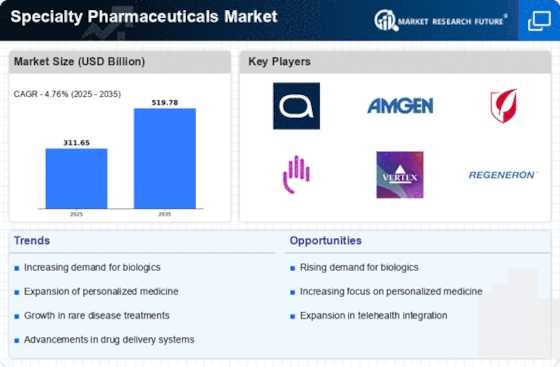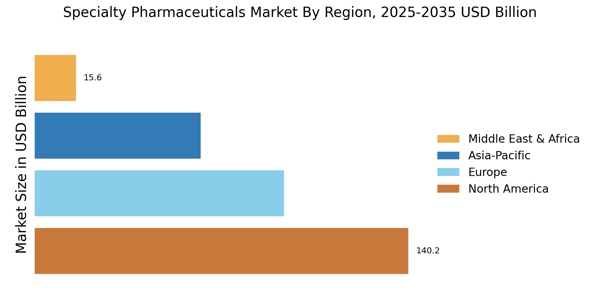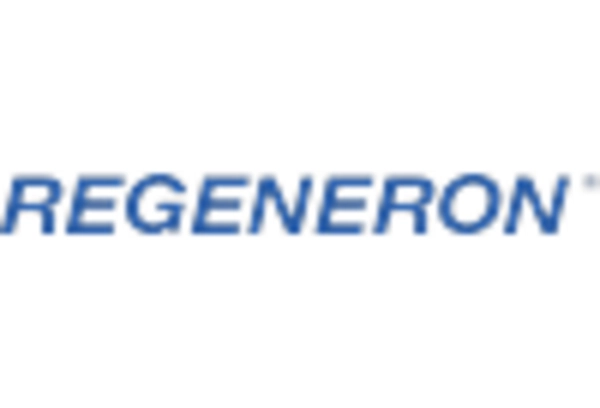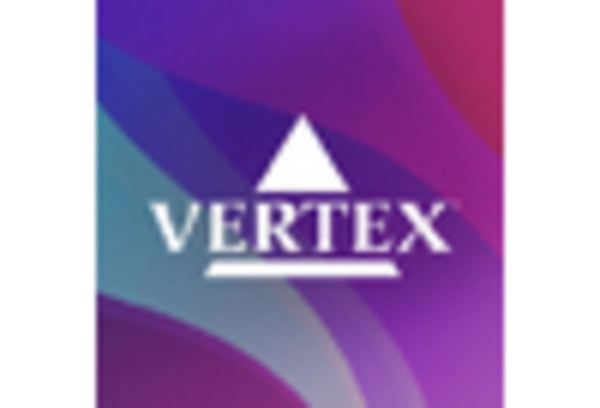Advancements in Biotechnology
Technological advancements in biotechnology are significantly influencing the Specialty Pharmaceuticals Market. Innovations in drug development, including monoclonal antibodies and gene therapies, are revolutionizing treatment options for various diseases. The biotechnology sector has seen substantial growth, with investments reaching billions of dollars, indicating a strong commitment to research and development. These advancements not only enhance the efficacy of treatments but also reduce side effects, making them more appealing to patients and healthcare providers alike. As a result, the market for specialty pharmaceuticals is likely to expand, driven by the introduction of novel therapies that address unmet medical needs and improve patient quality of life.
Regulatory Support and Incentives
Regulatory bodies are increasingly providing support and incentives for the development of specialty pharmaceuticals, which is a key driver for the Specialty Pharmaceuticals Market. Initiatives such as expedited approval processes and market exclusivity for innovative drugs encourage pharmaceutical companies to invest in research and development. For instance, the FDA's Orphan Drug Act offers incentives for developing treatments for rare diseases, which often fall under the specialty pharmaceuticals category. This regulatory environment not only accelerates the availability of new therapies but also enhances the attractiveness of the market for investors. As a result, the industry is likely to witness a surge in the introduction of novel specialty pharmaceuticals that address critical health challenges.
Rising Prevalence of Chronic Diseases
The Specialty Pharmaceuticals Market is experiencing a notable surge due to the increasing prevalence of chronic diseases such as diabetes, cancer, and cardiovascular disorders. As these conditions become more widespread, the demand for specialized medications tailored to treat complex health issues intensifies. According to recent data, chronic diseases account for approximately 70% of all deaths worldwide, underscoring the urgent need for effective therapeutic solutions. This trend is likely to drive innovation and investment in specialty pharmaceuticals, as healthcare providers seek advanced treatments that can improve patient outcomes. Furthermore, the growing aging population, which is more susceptible to chronic illnesses, further propels the market forward, creating a robust environment for specialty pharmaceuticals to thrive.
Increased Focus on Personalized Medicine
The Specialty Pharmaceuticals Market is increasingly shaped by the focus on personalized medicine, which tailors treatments to individual patient profiles. This approach is gaining traction as it promises improved efficacy and reduced adverse effects. The market for personalized medicine is projected to grow significantly, with estimates suggesting it could reach over 2 trillion dollars by 2025. This shift towards individualized therapies is prompting pharmaceutical companies to invest in research that aligns with genetic and biomarker data, thereby enhancing the precision of treatments. Consequently, the demand for specialty pharmaceuticals that cater to these personalized approaches is expected to rise, fostering a more targeted and effective healthcare landscape.
Integration of Digital Health Technologies
The integration of digital health technologies is transforming the Specialty Pharmaceuticals Market by enhancing patient engagement and treatment adherence. Digital tools such as mobile health applications and telemedicine platforms facilitate better communication between patients and healthcare providers, leading to improved health outcomes. The market for digital health is projected to grow significantly, with estimates indicating it could surpass 500 billion dollars by 2025. This trend is likely to drive the adoption of specialty pharmaceuticals, as patients become more informed and involved in their treatment plans. Furthermore, the use of data analytics in monitoring patient responses to medications can lead to more personalized treatment adjustments, thereby fostering a more effective specialty pharmaceuticals landscape.

















